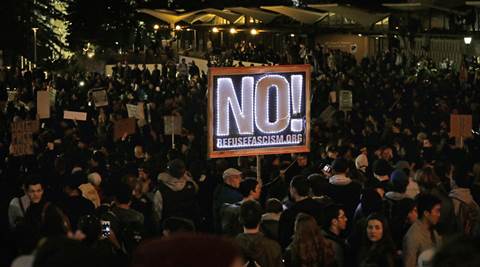Opinion No honours, Berkeley
Using violence to ban a far-right event, Berkeley challenges its own free speech legacy
 Protestors against a scheduled speaking appearance by polarizing Breitbart News editor Milo Yiannopoulos fill Sproul Plaza on the University of California at Berkeley campus on Wednesday, Feb. 1, 2017, in Berkeley, Calif. The event was canceled out of safety concerns after protesters hurled smoke bombs, broke windows and started a bonfire. (AP Photo/Ben Margot)
Protestors against a scheduled speaking appearance by polarizing Breitbart News editor Milo Yiannopoulos fill Sproul Plaza on the University of California at Berkeley campus on Wednesday, Feb. 1, 2017, in Berkeley, Calif. The event was canceled out of safety concerns after protesters hurled smoke bombs, broke windows and started a bonfire. (AP Photo/Ben Margot)  Protestors against a scheduled speaking appearance by polarizing Breitbart News editor Milo Yiannopoulos fill Sproul Plaza on the University of California at Berkeley campus on Wednesday, Feb. 1, 2017, in Berkeley, Calif. The event was canceled out of safety concerns after protesters hurled smoke bombs, broke windows and started a bonfire. (AP Photo)
Protestors against a scheduled speaking appearance by polarizing Breitbart News editor Milo Yiannopoulos fill Sproul Plaza on the University of California at Berkeley campus on Wednesday, Feb. 1, 2017, in Berkeley, Calif. The event was canceled out of safety concerns after protesters hurled smoke bombs, broke windows and started a bonfire. (AP Photo)
Once, the University of California, Berkeley, was famous for its passionate defence of free speech — and the right to hold all shades of political views. Today, it has challenged its own heady legacy. In the 1960s, Berkeley symbolised youthful resistance to a stifling American establishment, representing the injustices of Vietnam, racism and sexism. The times were violent; but Berkeley wasn’t. Facing hostile police and furious administrators, its students sang, spoke and marched against the powers of their time, their sit-ins, the original “Occupy” movements. Even when arrested or expelled, Berkeley students countered power’s brutishness with the brilliance of humane ideas — and the moral virtue of non-violence.
But current events have damaged Berkeley’s reputation. As notorious editor-writer Milo Yiannopoulos — infamous for his hate-filled views and a pillar of the pro-Trump “alt-right” — was scheduled to speak at Berkeley, students erupted in furious violence. Molotov cocktails were flung, students beaten up for “looking like Nazis”; even the iconic Martin Luther King Jr. Student Union was vandalised. University authorities cancelled Yiannopoulos’s event — but this is no victory for Berkeley. Instead, this adds fuel to the gleeful provocateur’s fire, leaving Berkeley less confident against charges that its left-leaning students don’t support free speech, but only the speech they like. This is one of the sharpest weapons globally used against liberal groups.
The argument that right-wing voices are denied space in liberal “echo-chambers” has gained ground, given Berkeley’s reaction today. Free speech is an untrammelled American right — barring direct incitement to violence, this freedom is equal for all. Abhorrent speech should be freely aired too, for when vile words, bereft of fundamental human empathy and hope, resound on the stages of the world, their stupidity and venality show under clear spotlights. As a university meant to experience, understand and debate all forms of thought, Berkeley should have let Yiannopoulos speak, coolly ignoring him or grilling him with intelligent contempt. Instead, Berkeley has made Yiannopoulos an unlikely victim, whose fundamental freedom has been deprived by people claiming to protect exactly that. Berkeley is a reminder of an inconvenient truth: Freedom of speech cannot be tailored to please certain ears. That would only justify the bullying of artists, the murders of cartoonists, the arrests in another university called JNU, whose students upheld the right to express all shades of opinion, with only one common proviso: Non-violence.





